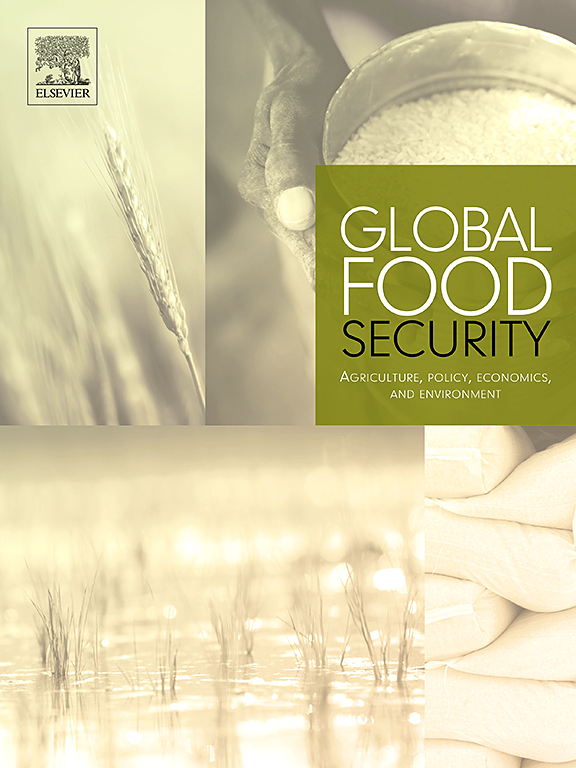韧性和包容性农村转型:改善营养的途径
IF 9.6
1区 经济学
Q1 FOOD SCIENCE & TECHNOLOGY
Global Food Security-Agriculture Policy Economics and Environment
Pub Date : 2025-07-12
DOI:10.1016/j.gfs.2025.100871
引用次数: 0
摘要
农村转型是指农村经济从主要以低收入为生的生产转向融入国家市场的生产性更强、多样化的活动。这种转变刺激了经济增长,减少了贫困,促进了营养转型。然而,相关的农业粮食系统已被证明在很大程度上是不可持续的,因为它们受到生物多样性丧失、全球变暖加剧以及对饮食和营养结果的混合影响的影响。本文结合了对更具弹性和包容性的农村转型途径的多学科思考。我们首先确定了需要解决的四个公认的营养挑战:1)农村人力资本建设中的不平等及其与农村转型相关的社会决定因素;低收入和中等收入国家营养不良负担翻倍上升;(三)认识到粮食环境是获得健康饮食的关键决定因素;iv)在越来越多的冲击下,饮食和营养结果的严重不平等。我们将这些挑战与四个新出现的优先事项结合起来考虑,这些优先事项需要更加重视有韧性和包容性的农村转型:1)明确关注包容性;(二)尊重土著人民的作用;iii)解决农村景观的空间变化及其对饮食转变的影响;考虑农村生计多样化、移民和粮食环境,以实现有韧性和包容性的农村转型。最后,我们建议扩大现有的改善营养饮食的农业途径,加强对性别、气候适应和韧性、政策一致性和价值链联系的关注,以解决多种形式的营养不良,同时保持在地球范围内。本文章由计算机程序翻译,如有差异,请以英文原文为准。
Resilient and inclusive rural transformation: Pathways towards improved nutrition
Rural transformation refers to a shift in rural economies from predominantly subsistence-oriented production with low incomes to more productive, diversified activities integrated into national markets. Such transformation has spurred economic growth, reduced poverty, and facilitated nutrition transition. However, the associated agrifood systems have proven largely unsustainable, as they are subject to biodiversity loss, increased global warming, and mixed impacts on dietary and nutrition outcomes. This paper combines multi-disciplinary reflections on the pathways towards more resilient and inclusive rural transformation. We first identify four well-established nutrition challenges to addressing: i) rural inequality in building human capital and its associated social determinants for rural transformation; ii) rising double malnutrition burdens in low- and middle-income countries; iii) recognizing that food environment is a key determinant of access to healthy diets; and iv) profound inequality in dietary and nutrition outcomes under an increasing number of shocks. We consider these challenges alongside four emerging priorities that require greater emphasis for resilient and inclusive rural transformation: i) Explicit focus on inclusivity; ii) Respecting Indigenous people's roles; iii) Addressing spatial changes to rural landscapes and implications on dietary transitions; and iv) Considering rural livelihood diversification, migration, and food environment for resilient and inclusive rural transformation. Finally, we propose expanding existing agricultural pathways towards improved diets for nutrition by integrating a stronger focus on gender, climate adaptation and resilience, policy coherence, and value chain linkages to address multiple forms of malnutrition while remaining within planetary boundaries.
求助全文
通过发布文献求助,成功后即可免费获取论文全文。
去求助
来源期刊

Global Food Security-Agriculture Policy Economics and Environment
FOOD SCIENCE & TECHNOLOGY-
CiteScore
20.90
自引率
3.40%
发文量
69
期刊介绍:
Global Food Security plays a vital role in addressing food security challenges from local to global levels. To secure food systems, it emphasizes multifaceted actions considering technological, biophysical, institutional, economic, social, and political factors. The goal is to foster food systems that meet nutritional needs, preserve the environment, support livelihoods, tackle climate change, and diminish inequalities. This journal serves as a platform for researchers, policymakers, and practitioners to access and engage with recent, diverse research and perspectives on achieving sustainable food security globally. It aspires to be an internationally recognized resource presenting cutting-edge insights in an accessible manner to a broad audience.
 求助内容:
求助内容: 应助结果提醒方式:
应助结果提醒方式:


